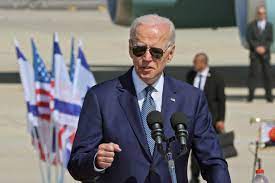On Thursday, US Vice President Joe Biden and Israeli Prime Minister Yair Lapid will sign a joint declaration pledging to prevent Iran from obtaining nuclear weapons, reuniting the allies after years of contention over international diplomacy with Tehran.
In an apparent effort to accede to Lapid’s requests that the international community present a “credible military threat” against Israel’s main adversary, Iran, Biden, who is in Jerusalem, said on Wednesday that he was open to the “last resort” use of force against Iran.

Such subliminal threats against Iran, which denies pursuing nuclear weapons, have been made separately by the United States and Israel for years. Formally expressing the rhetoric may increase mutual action commitment and deterrence.
Biden might get encouragement from the US and Israel’s display of resolve when he travels on to Saudi Arabia on Friday. Biden hopes to use Riyadh’s concerns about Iran to foster reconciliation between Israel and Saudi Arabia under US supervision.
According to one US official, “I think what you’ll see in the joint declaration is a pledge and a commitment never to permit Iran to acquire a nuclear weapon and that we’re prepared to use all elements of our national power to ensure that outcome.”
Iran agreed to a global agreement in 2015 that capped projects with the potential to make bombs. When Donald Trump, then-US President, withdrew from the agreement in 2018, Israel applauded his decision.
Since then, Iran has intensified some nuclear activities, making it more difficult for the world’s powers to reach a deal during the Vienna talks. Israel has now stated that it would support a new agreement with stricter clauses. Iran has refused to comply with new restrictions.
In an interview with Israeli television on Wednesday, Biden said, “The only thing worse than the Iran that exists now is an Iran with nuclear weapons. If we can return to the deal, we can hold them tight.”
According to some Israeli and Gulf Arab officials, the sanctions relief from the deal will give Iran more money to support proxies in Lebanon, Syria, Yemen, and Iraq. Additionally, they doubt that the Biden administration will take significant action to
When asked if the declaration made on Thursday was intended to buy time with Israel while Washington pursued talks with Iran, the American official responded, “If Iran wants to sign the deal that has been negotiated in Vienna, we have made very clear we’re prepared to do that. At the same time, if they are not, we will keep up the pressure of our sanctions and further isolate Iran diplomatically.
The threat of military action, according to a senior Israeli official, is a strategy for averting war.
Director-general of the Defense Ministry Amir Eshel told Israel’s Kan radio that “(it) is a guarantee that the diplomatic, economic, and legal efforts against Iran will be effective.” Iran has demonstrated to everyone that when it is strongly pressed, it knows how to halt and change its ways.


